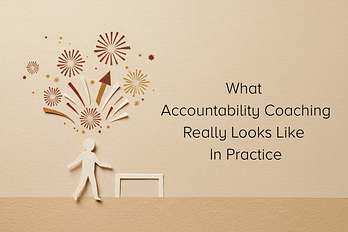January 18, 2022 - Coaching Business
How To Manage Coach And Client Conflict
Have you ever found yourself in a coach and client conflict?

As a coach, you may alter or tweak your techniques so as to help your clients see things from a different perspective.
However, even with the best of intentions, coach and client conflicts can and do happen.
In general, people tend to avoid conflicts so as to avoid hurting others’ feelings or getting hurt themselves.
Conflict situations are often associated with misgivings and misinterpretations.
It can be overwhelming and disappointing, especially if the situation blows out of proportion when the long-term credibility that you have established goes up in flames within minutes due to a simple miscommunication.
What should you say?
How do you diffuse the situation?
Do you resolve it via email or phone or a physical meeting?
Should you remain cordial with the client?
The answers to these questions will become clearer once we learn how to regulate and not overcorrect or overreact to the situation.
If we apply sensible methods to resolve the conflict, the strength of your coach and client relationship might just end up being even better than before!
Before we delve into the topic of conflict resolution, let’s first explore how you can foster a strong trust foundation with your clients in the first instance.
Begin by looking from the outside. Put yourself in the client’s shoes. What attributes would you look for in a trustworthy coach?
-
ESTABLISH TRUST FROM THE FIRST POINT OF CONTACT
Always be consistent and clear with all the “how, what, when, and why’s” of your coaching business, both verbally and in writing (your website, social media, email inquiries).
-
PRE-SCREENING
Pre-screening potential clients is an important first step towards establishing an effective coach and client partnership.
This is a win-win situation for you and your client. You get to work with your ideal client persona while your client would have the opportunity to understand your coaching approach before confirming the engagement.
It’s also a sensible approach to avoid a coach and client mismatch from happening from the get-go.
-
SET BOUNDARIES
Your relationship with your client is a two-way street. If you respect yourself, your clients will too! Be firm when it comes down to matters such as session cancellations, fees, and payment terms.
-
BE HONEST BUT EMPATHETIC
When you engage with your coaching clients, bear in mind that you will be working with them over a period of time to achieve results. It is building a relationship over time.
However, you need to be upfront and candid with your clients in order to help them get the outcomes that they desire, even if that means being brutally honest with them.
Therefore, set expectations with your clients during the discovery call and make it crystal clear that in order for you to help them best, you will need to be honest about everything and that they can be honest with you too.
This helps build a co-relationship between you and your clients.
-
ACCOUNTABILITY
Last but not least, the most important one of all: accountability.
Remember that accountability works both ways. It does not only apply to your clients, it applies to you, too.
Always maintain professionalism with punctuality, finetuning your craft, and taking good care of yourself.
If you need a tool to help you stay accountable, feel free to review the International Coaching Federation's Coach Core Competencies.
You can use these industry benchmarks to perform a self-assessment from time to time to see how you’re measuring up.
Manage Your Coaching Practice in One Place
CoachVantage automates your business workflows so you can focus on impactful coaching results.
Now, let’s explore some possible causes that could lead to a coach and client conflict.
COMMON CAUSES OF COACH AND CLIENT CONFLICT
- Miscommunication
- Preconceived notions
- Failure to set a clear direction for a coaching session
- Coach and client mismatch
- The expectation of ‘instant gratification’
- Coaching the issue and not the person
- Lack of accountability
Bear in mind that the above examples are in no particular order.
To a high degree, coaching involves effective communication which can only happen when there are two active, participating parties. Not just one. It should always be balanced.
HOW TO RESOLVE COACH AND CLIENT CONFLICT
There are a few scenarios to consider when trying to resolve a conflict between coach and client:
-
What to do DURING a conflict
-
What if the relationship CAN’T be salvaged after the conflict
-
What if the relationship CAN be salvaged and post-conflict suggestions
WHAT TO DO DURING CONFLICT
-
Allow your clients and yourself to feel the emotions
a) When conflict happens, allow some time for your clients to shout, cry or vent their emotions.
b) Be compassionate with yourself, too. If you do need time for yourself to reassess the situation, honesty is the best policy. Inform your client that you need time away to evaluate the situation and re-strategize.
-
Discern the severity of the conflict
You know your clients best.
You have to be realistic and analyze whether the relationship with your client can be salvaged or not with the highest level of professionalism.
WHAT IF THE COACH AND CLIENT RELATIONSHIP CAN’T BE SALVAGED
- An ICF article proposed:
“Co-create the completion and ask questions such as how they would like to bring the partnership to a close? What do they need to feel complete? Consider those same questions for yourself. Treat the conversation as an opportunity to offer continued value by staying curious, leaving space for new learning, and offering appreciation. If appropriate, acknowledge and celebrate whatever results the client experienced”.
WHAT IF THE RELATIONSHIP CAN BE SALVAGED AND POST-CONFLICT SUGGESTIONS
-
Identify the trigger point.
Work together with your client and ask them questions such as:
- What do you think triggered the emotion?
- Was there an entrenched belief that led to the trigger?
- Was there a shift in your goal?
-
Stay neutral
As a coach, you have to keep your clients and their needs in the right perspective. It’s important to free yourself of your own biases, especially after a conflict, to keep the right attention on the needs of your clients.
-
Focus on common ground
Even individuals with opposing values can share a lot of similar perspectives. A common conflict-negotiation tactic when two groups seem to be at odds with one another is to help them recognize that they still share commonalities.
-
Tap onto your client’s strengths
Each client is unique, brilliant, and resourceful. Encourage them to utilize their strengths. The client knows what success looks like to them and how to go about getting it. It is not the coach's responsibility to align their values and the client's values.
-
Inculcate “holding space” exercises with your client
According to JRNI’S blog, “Holding space” is both about how we listen and respond to our clients, and also in how we show up as human beings. It is more than listening. When we can hold space effectively in a variety of ways, it creates the conditions that allow our clients to go deep. From this place, they can better tap into their own experiences, insights, and revelations”.
It is not a physical space. It is a moment in time that encompasses mental, expression, emotional/psychological, and energetic space.
CONCLUSION
Great coaching extends well beyond coaching models, questioning techniques, and goal attainment strategies. It is both holistic and physical.
Hence, it is normal to be faced with adversities such as conflict.
If it is easy, it is probably not worth it!
CoachVantage is a coaching tool that helps you and your clients establish and forge a strong partnership. It enables client accountability and helps you to keep track of your client’s progress and development.
Click the button below to start your CoachVantage free trial.
Want More Coaching Clients?

Get Your Free Guide to Create An Irresistible Lead Magnet
And attract clients who want to work with you.
Get Your Free Guide NowYou might also like...

How To Choose Your Life Coaching Niche

What Accountability Coaching Really Looks Like In Practice




